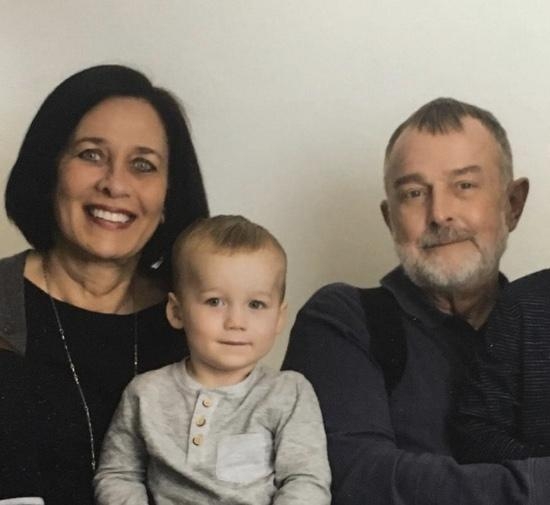Trip to NW Arkansas Results in Life-saving Hospital Visit for Army Veteran
9/8/2020

A trip to see family in Northwest Arkansas saved his life. That’s what Thomas Grooman of Nebraska City will tell you. And now he comes back to Springdale just to see his new cardiologist, Dr. Michael Green.
Grooman already knew he had heart disease. A veteran, he’d been diagnosed at his local VA hospital with two partially clogged coronary arteries, one at 60% and another at 30%. He was taking blood thinners to minimize the risk of a blood clot causing a heart attack in the narrowed vessels.
“When I woke up that Thursday morning, I didn’t feel good,” he said. “I was breathing hard, very short of breath. I just didn’t feel right. So I made the decision to get to the closest ER fast.”
His sister-in-law drove Grooman, along with his wife, to Northwest Medical Center-Springdale, a nationally accredited Chest Pain Center.*
“I remember going through doors but that’s the last thing I remember. I woke up three days later in the Intensive Care Unit.”
Grooman had not just experienced a heart attack, but had gone into cardiogenic shock (CS). That’s a medical emergency during which the heart suddenly can't pump enough blood to meet the body's needs. Cardiogenic shock is a complication that occurs less than 10% of the time, but when it does, only about 30% of those patients with this profound condition will survive.
Fortunately for him, Northwest Medical Center-Springdale was one of the first 50 hospitals nationwide to participate in a new study to identify the best treatment for people who experience cardiogenic shock following a heart attack (AMI-CS). Called the National Cardiogenic Shock Initiative (NCSI), this multicenter study was designed to show whether outcomes in cardiogenic shock can be improved by using standardized best practices including inserting a special heart pump to protect the patient during a percutaneous coronary intervention (PCI), such as placing a stent to open a blocked vessel.
Interventional cardiologist Dr. Michael Green was the lead investigator locally. He promptly initiated the protocol, implanting what’s known as “the world’s smallest heart pump” to keep Grooman’s body oxygenated while he opened the vessel that was now 99% blocked.
“Approximately 8% of patients who suffer an acute heart attack each year will develop cardiogenic shock. That’s about 60,000 people,” Dr. Green said. “The initial pilot study has shown improvement in survival rates from around 30% to 76%. In recent years, we had seen impressive gains in the treatment of ST-segment elevation myocardial infarction (STEMI) which were treated by primary percutaneous coronary intervention (PCI), resulting in a 21% decrease in mortality. However, myocardial infarction (heart attacks) that were complicated by cardiogenic shock (AMI-CS) had not seen similar successes and had continued to have a high mortality rate, near 70%. Further, recent trials had not clarified the best strategies in treatment,” Dr. Green said. “This very significant study has led to the identification of the best practices for treatment that will save lives,” he said.
The study was first conceived shortly after a new device was approved in April 2016 by the U.S. Food and Drug Administration – a percutaneous transvalvular continuous-flow microaxial MCS device for use specifically in AMI-CS (a mini heart pump). It is believed this device – and others like it introduced since that time – can play a major role in the care of patients with AMI-CS just as PCI had for STEMI. The National Cardiogenic Shock Initiative (NCSI) provides an algorithm to maintain consistency and reproducibility that may provide insights for the future into the best practices associated with the use of such devices.
The care of patients with AMI-CS is a national issue, declared as a priority by the Institute of Medicine. Historically, recruitment in clinical trials of CS has been difficult, with a low number of enrollees preventing implementation of evidence-based therapies. Partnering hospital systems in the NCSI study – like both Northwest Medical Center-Springdale and Northwest Medical Center-Bentonville – use a defined protocol for treatment of AMI-CS patients. This includes quick placement of the heart pump, PCI to open the blocked vessel(s), and right heart monitoring to rapidly reduce the use of inotropes, medications that affect the contraction of the heart muscle.
Thanks to fast action by the Springdale emergency and cardiac care teams, the hospital’s participation in this national study, and Dr. Green’s knowledge, Grooman is looking forward to the rest of his retirement.
“If my heart attack had happened here in Nebraska City, I wouldn’t be here today. The closest hospital is 40 miles north. I was real pleased with my treatment and couldn’t have asked for any better.”
Grooman, who visits Northwest Arkansas several times a year, now comes back to Springdale for his cardiology check-ups to see Dr. Green.
*The American Heart Association recommends calling 9-1-1 for the best and most immediate care possible.
Back